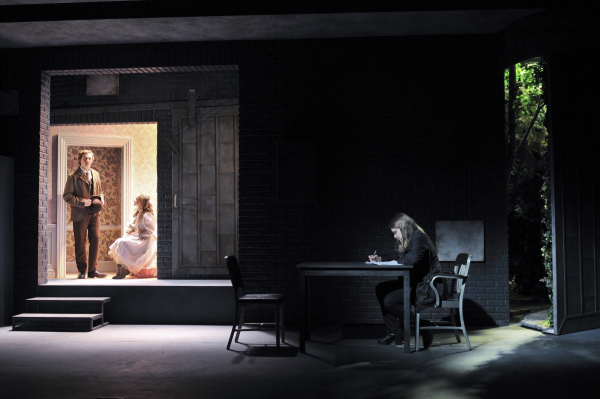The Nether

(© Jenny Anderson)
The line between harmless fantasy and deadly reality seems to evaporate and rematerialize without notice in Jennifer Haley's The Nether, now making its New York premiere with MCC Theater at the Lucille Lortel Theatre. A dark dystopian tale, the play is imagined in shockingly realistic fashion by director Anne Kauffman. It's impossible not to hear echoes of our own rapidly changing world in this brilliant and unsettling new play.
Sometime in the not-too-distant future the Internet has morphed into "the Nether," a virtual realm we experience with all our senses. Limited resources and environmental catastrophe have forced a large portion of human activity online. Eighty percent of all offices exist in the Nether, and only the wealthiest can afford tuition at a brick-and-mortar university. But programming code has become so sophisticated that many people opt to live their entire lives in this beautiful digital fantasy rather than the tarnished reality of the natural world. The aptly named Mr. Sims (Frank Wood) runs a small and exquisitely programmed corner of the Nether he calls "The Hideaway," a Victorian dream home in which Beethoven wafts elegantly over snifters of 50-year-old Cognac. It's an idyllic setting for some truly horrifying activity.
Sims (who goes by "Papa" in the Nether) allows customers like Doyle (Peter Friedman) to act out their most deviant fantasies with young girls like Iris (Sophia Anne Caruso). Of course, Iris is not actually an underaged girl, but an adult playing a role. "This is in accordance with the statute on consensual role-play," Sims insists. Still, Nether employee Detective Morris (Merritt Wever) is disturbed enough to investigate, sending Agent Woodnut (Ben Rosenfield) to spy on the Hideaway. Morris doesn't believe this is a victimless fantasy.
The central question of Hayley's play is whether such fully rendered illusion deters sexual assault or throws gasoline on a fire. The same debate rages in our own time about the proliferation of online pornography. As Sims, Wood brings a clear and powerful voice to the notion that technology can be a useful outlet for destructive sexual urges. "I am sick and have always been sick and there is no cure," he flatly states, practically bullying the younger detective. "I am protecting my neighbor's children and my brother's children and the children I won't allow myself to have, and the only way I can do this is because I've created a place where I can be my f*cking self!" It's hard not to be convinced by his self-awareness, even if he sees no discord between his violent desires and the rarified environment he has designed as its safe haven.
Set designer Laura Jellineck allows glimmers of Sims' vibrant fantasy realm to peek out from behind the grime of a gray and dimly lit interrogation room. Secret compartments open, revealing a verdant garden, a stately hallway, a pink little girl's bedroom. Everything is bright and colorful (thanks in part to smartly contrasting lighting plots by designer Ben Stanton). The denizens of the Hideaway wear neat three-piece suits and immaculate frilly dresses, starkly contrasting with the rumpled black T.J. Maxx pantsuit Morris wears (costumes by Jessica Pabst). Truly, most people would prefer the Hideaway to the real world if it weren't for the awful things occurring in the upstairs bedrooms.
"Perhaps you'd like to start with the axe," the uncomfortably accommodating Iris suggests to Woodnut, much to his horror. Caruso delivers a bravura performance of shocking maturity for someone who appears so young and innocent. Conversely, Friedman feels fragile and childlike, especially under the scrutiny of Morris. Quite appropriately, Wever has the abrasively formal nosiness of an overly ambitious TSA agent. She is completely convinced of the righteousness of her mission, never stopping to consider that she might be causing more harm with her good intentions. "You don't know what you do, Detective, putting me out into the world," Sims threatens. We believe him.
In order for dystopian drama to truly resonate, one must see a direct path from our current world to the dark future depicted on the stage. As behemoths like Google and Facebook increasingly become the gatekeepers of the online world (something essential to our 21st-century lives), they render democratically elected governments increasingly irrelevant. Perhaps someone like Detective Morris already exists in an office in Cupertino. Men like Sims and Doyle most certainly exist. As staged by Kauffman, the stakes of The Nether feel urgent and real. It may give you pause the next time you see a room full of faces buried in smartphones.










